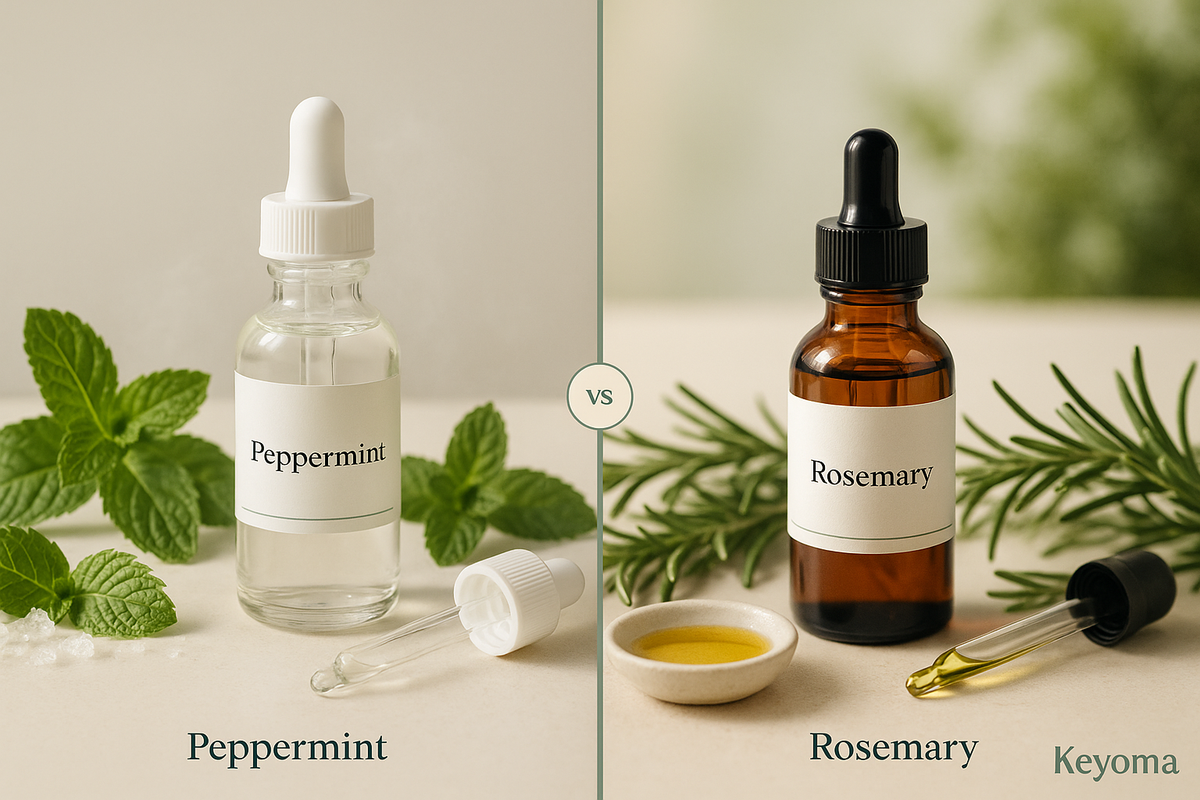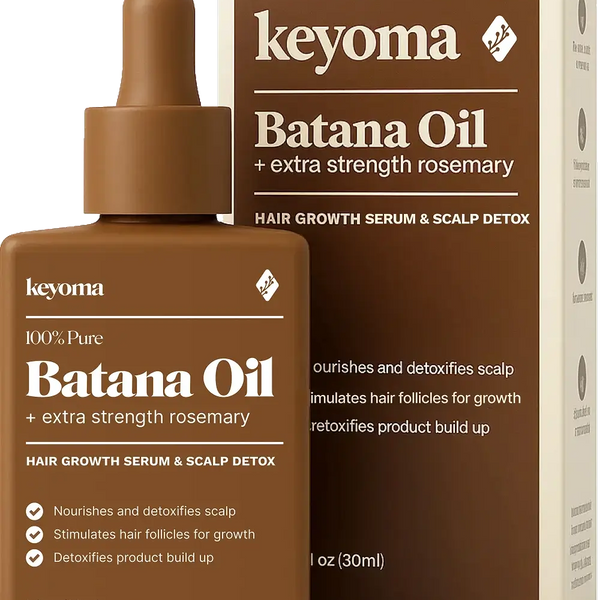In this article
Essential oils are popular for their potential benefits, and two often mentioned for hair growth are peppermint oil and rosemary oil. Both are known for stimulating hair follicles, supporting scalp health, and encouraging growth.
So which one serves you better? In this guide, you’ll compare peppermint oil and rosemary oil, review the research on each, and learn how to use them in your hair care routine.
Key Takeaways
-
Peppermint and rosemary oils stimulate follicles, support scalp health, and promote hair growth.
-
Peppermint oil improves scalp circulation, soothes inflammation, and shows strong growth in mice.
-
Rosemary oil stimulates follicles, may reduce DHT-linked thinning, matching minoxidil efficacy with fewer side effects.
-
Peppermint suits general thinning but can irritate sensitive scalps, while rosemary is gentler.
Peppermint Oil: How It Supports Hair Growth
Peppermint oil comes from the leaves of the peppermint plant (Mentha piperita). Menthol creates a cooling, tingling feel on your scalp. People have long used it for comfort, and it has also drawn attention for its potential to promote hair growth.

Peppermint Oil: Key Benefits
-
Improves circulation: Menthol in peppermint oil boosts scalp blood flow, stimulating follicles and encouraging growth.
-
Soothes the scalp: Peppermint oil may calm inflammation and dandruff, creating a healthy setting for hair to grow.
-
Antimicrobial properties: It helps keep your scalp cleaner and reduces bacteria that could hinder growth.
Research on Peppermint Oil for Hair Growth
A 2014 study in Toxicological Research tested peppermint oil for hair growth in mice. The researchers compared peppermint oil to minoxidil (a common hair growth treatment), saline, and jojoba oil over four weeks. The peppermint group showed the greatest increase in growth, with deeper follicles and thicker dermis than the others.
The study suggested peppermint oil could be a promising option for hair loss because it promoted faster, thicker growth in that model. This positions peppermint oil as a strong natural choice to consider.
Rosemary Oil: How It Supports Hair Growth
Rosemary oil comes from the leaves of the rosemary plant (Rosmarinus officinalis). Known for its rich scent and traditional uses, rosemary oil has been used in hair care for centuries to support growth and scalp health.

Rosemary Oil: Key Benefits
-
Stimulates hair follicles: Rosemary oil stimulates the scalp and improves circulation, which can promote regrowth.
-
Helps prevent thinning: It may reduce shedding by supporting a longer growth cycle.
-
Eases scalp irritation: Rosemary oil can calm an irritated scalp, useful for dandruff and itch.
Research on Rosemary Oil for Hair Growth
A 2015 study in Skinmed compared rosemary oil to 2% minoxidil for androgenetic alopecia. Over six months, participants used either rosemary oil or minoxidil. The results showed rosemary oil performed as well as minoxidil, with fewer reports of scalp irritation.
A 2013 study also suggested rosemary oil may help reduce DHT (dihydrotestosterone), a hormone linked to hair loss. That makes rosemary oil appealing for pattern hair loss tied to hormones.
Peppermint Oil vs. Rosemary Oil: Which Is Better for Hair Growth?
Now that you’ve seen the benefits and research on both oils, here’s how peppermint oil vs rosemary oil compares so you can decide what might work best.
|
Factor |
Peppermint Oil |
Rosemary Oil |
|
Mechanism |
Boosts scalp blood flow (cooling, tingling) |
Stimulates follicles, targets DHT-related thinning |
|
Evidence |
2014 mouse study: strong growth |
2015 human trial: as effective as minoxidil, fewer side effects |
|
Sensitivity |
Strong on sensitive scalps, dilute |
Gentler, lower irritation risk |
|
Best for |
Slow growth, general thinning |
Hormonal/DHT thinning, androgenetic alopecia |
1. How It Works
Peppermint oil: Works mainly by boosting blood flow to the scalp with its cooling, tingling effect, which supports follicle health and growth.
Rosemary oil: Stimulates follicles and improves scalp circulation, while addressing DHT-related thinning that drives hair loss.
2. Scientific Evidence
Peppermint oil: The 2014 animal study showed peppermint oil can markedly enhance hair growth, with results that rival common treatments.
Rosemary oil: The 2015 human study found rosemary oil performs as well as minoxidil for androgenetic alopecia, with fewer side effects.
3. Scalp Sensitivity
Peppermint oil: Because of its cooling effect, it can feel intense on sensitive scalps. Dilute it with a carrier oil such as batana, coconut or jojoba before use.
Rosemary oil: Generally gentler on the scalp, making it a good option for people prone to irritation.
4. Hair Type and Conditions
Peppermint oil: A fit for anyone hoping to speed up growth, especially when slow growth or diffuse thinning is the main concern.
Rosemary oil: Suits hair thinning tied to hormones, including DHT-related loss and androgenetic alopecia.
Can You Mix Peppermint Oil With Rosemary Oil for Hair Growth?
Yes, you can, as long as you blend and apply them correctly.
Start with a small amount of each—about 2–3 drops of rosemary oil and 1 drop of peppermint oil per tablespoon of a carrier like batana, jojoba, grapeseed, or almond. You’ll capture benefits from both while limiting irritation.
Use the blend as a pre-shampoo treatment or a nightly scalp massage. I noticed three minutes of massage made my scalp feel calmer. Apply it to your scalp (not hair shafts) and massage briefly to support circulation.
Reduce the peppermint amount if your scalp is sensitive. You can also do a patch test before full use.
Choose Your Oil, Dilute Safely, and Track Results With Keyoma
Peppermint and rosemary essential oils can support scalp health when you use them well. Peppermint creates a cooling feel and is more potent, so you need careful dilution. Rosemary supports follicles and may help with DHT-related thinning; results vary, and your scalp may respond differently than someone else’s.
The better choice is the one your skin tolerates and the one that fits your goals. For a simple carrier that blends well with either oil, consider Keyoma Pure Batana Oil. With steady, gentle care and realistic expectations, you can build a routine that supports a calmer scalp and healthier-looking hair over time.
Featured Product
100% Pure Batana Oil + Rosemary









